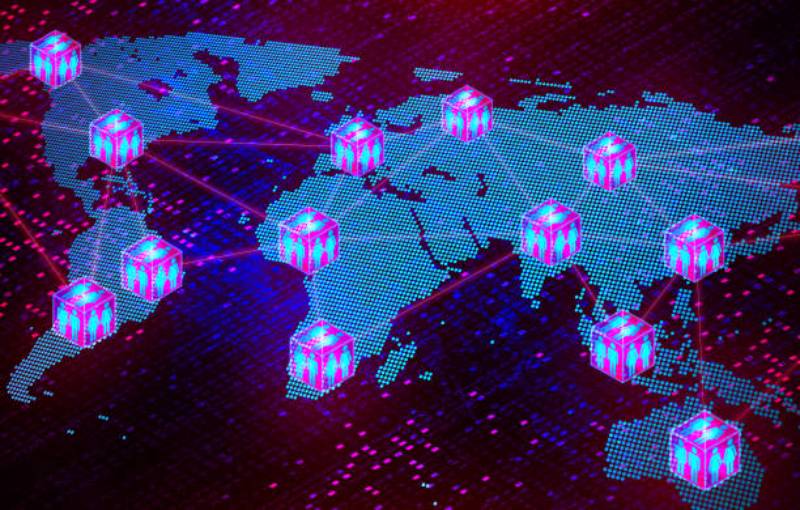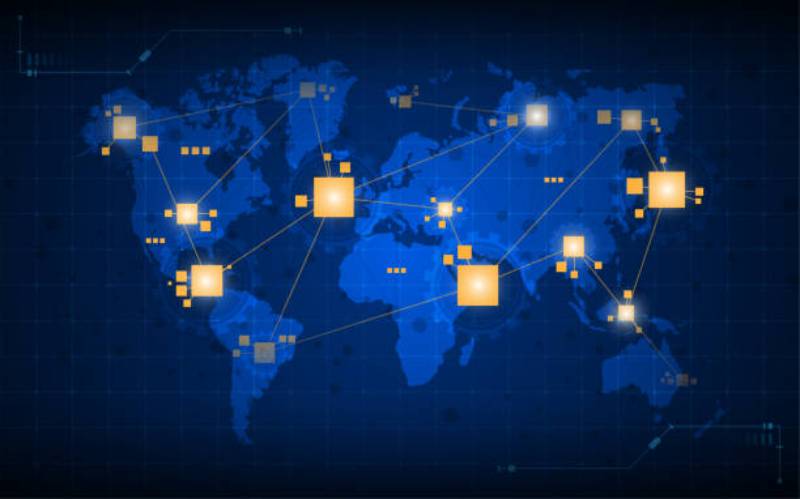
How Blockchain Is Reshaping Global Supply Chains
6 min read
12 Oct 2025
Introduction
Blockchain technology is revolutionizing global supply chains by providing transparency, traceability, and security. In an era of increasing complexity, where goods traverse multiple countries and stakeholders, blockchain offers a decentralized and immutable ledger that ensures accountability and trust across the entire supply chain.
The Challenges in Traditional Supply Chains
Global supply chains often suffer from inefficiencies, lack of transparency, counterfeiting, and delayed information flow. Businesses struggle with tracking products, verifying authenticity, and ensuring compliance with regulations. These challenges increase operational costs, reduce consumer trust, and limit the efficiency of international trade.
How Blockchain Addresses Supply Chain Challenges
Blockchain introduces a decentralized ledger where each transaction is recorded and verified by network participants. Key benefits include: - **Transparency: Every participant can access the same information, reducing errors and miscommunication - **Traceability: Products can be tracked from origin to delivery, ensuring authenticity and reducing fraud - **Security: Data recorded on the blockchain is immutable and tamper-proof, enhancing trust among stakeholders - **Efficiency: Automated smart contracts streamline processes, reducing administrative overhead and delays
Real-World Applications of Blockchain in Supply Chains
Several industries are already leveraging blockchain to enhance supply chain management: - **Food Industry: Companies like Walmart and Nestle use blockchain to trace the journey of food products, ensuring safety and freshness - **Pharmaceuticals: Blockchain helps verify the authenticity of medicines and prevents counterfeiting - **Luxury Goods: Brands like LVMH and De Beers use blockchain to track product provenance, ensuring authenticity and sustainability - **Logistics:** Shipping companies employ blockchain to monitor cargo movement, automate documentation, and improve cross-border trade efficiency
Benefits for Businesses
Implementing blockchain in supply chains offers numerous advantages: - Improved transparency and accountability - Reduced risk of fraud and counterfeit products - Faster and more efficient transactions through smart contracts - Better regulatory compliance and reporting - Enhanced customer trust through verifiable product information
Challenges of Implementing Blockchain in Supply Chains
Despite its benefits, blockchain adoption comes with challenges: - High initial costs of deployment and integration - Need for stakeholder collaboration across the supply chain - Regulatory and legal uncertainties in different countries - Scalability issues and energy consumption concerns - Requirement for technical expertise to maintain and operate blockchain systems
The Future of Blockchain in Global Supply Chains
Blockchain is poised to become a standard in global supply chain management. Integration with IoT, AI, and big data will further enhance traceability, predictive analytics, and operational efficiency. As more companies adopt blockchain and regulatory frameworks evolve, supply chains will become more transparent, secure, and resilient. Consumers will also benefit from greater confidence in product authenticity and ethical sourcing practices.

Case Studies of Blockchain Success
- Walmart uses blockchain to track leafy greens and other perishables, reducing the time needed to trace product origins from days to seconds.
- De Beers tracks diamonds from mine to retailer using blockchain, ensuring ethical sourcing and authenticity.
- Maersk collaborates with IBM to implement TradeLens, a blockchain-based shipping platform that increases transparency and efficiency in global logistics.
[https://blocknine.cloud/How-Blockchain-is-Powering-the-New-Wave-of-Smart-Contracts](How Blockchain is Powering the New Wave of Smart Contracts )
Conclusion
Blockchain is reshaping global supply chains by enhancing transparency, security, and efficiency. While challenges remain, the benefits for businesses and consumers are substantial. As blockchain technology continues to evolve, it will drive the next generation of smart, secure, and transparent supply chains, fundamentally transforming how goods move across the globe.
FAQs
How does blockchain improve supply chain transparency?
Blockchain improves supply chain transparency by recording every transaction in a decentralized, tamper-proof ledger visible to authorized participants. This reduces fraud, errors, and miscommunication, while ensuring accountability at each stage. Companies and consumers can track product movement in real-time, boosting trust and reliability, making supply chain operations more efficient, secure, and transparent across industries.
Which industries benefit most from blockchain in supply chains?
Industries like food, pharmaceuticals, logistics, and luxury goods benefit most from blockchain in supply chains. It ensures traceability, product authenticity, compliance, and safety standards. Blockchain helps reduce recalls, improve regulatory reporting, and strengthen consumer confidence. These industries gain efficiency, transparency, and reduced risks, making them early adopters of blockchain-powered supply chain innovations worldwide.
Can blockchain reduce counterfeiting?
Yes, blockchain can reduce counterfeiting by tracing products from origin to final delivery. Every transaction is securely recorded, making it nearly impossible for fake goods to enter unnoticed. Consumers can verify product authenticity via blockchain-enabled QR codes or smart tags, ensuring genuine purchases. This creates trust and safeguards industries vulnerable to counterfeit products.
What challenges do businesses face when implementing blockchain?
Businesses face challenges such as high setup costs, regulatory uncertainties, scalability concerns, and lack of cross-industry collaboration. Technical expertise is also required to deploy and maintain blockchain systems. Integrating blockchain with legacy infrastructure can be complex. Overcoming these hurdles requires investment in training, regulatory clarity, and partnerships to ensure successful blockchain adoption in supply chains.
How do smart contracts improve supply chain efficiency?
Smart contracts improve supply chain efficiency by automating tasks like payments, shipment tracking, and compliance checks. They reduce reliance on intermediaries, minimize human error, and speed up processing times. By executing predefined conditions automatically, smart contracts ensure accuracy and accountability across the supply chain, making operations more seamless, cost-efficient, and reliable for businesses.
Is blockchain scalable for global supply chains?
Scalability has been a concern, but advancements like layer-2 solutions, sharding, and efficient consensus mechanisms are improving blockchain’s capacity for global supply chains. These innovations enable faster transactions at lower costs, supporting large-scale operations. While challenges remain, ongoing development suggests blockchain will soon handle complex international supply chain networks effectively and more reliably worldwide.
Can blockchain integrate with other technologies?
Yes, blockchain can integrate with IoT, AI, and big data analytics. IoT sensors send real-time shipment data to blockchain, AI provides predictive analytics for risks, and big data enhances decision-making. Together, these create intelligent, automated supply chains with improved accuracy, efficiency, and resilience. Integration maximizes blockchain’s impact, delivering smarter, safer, and more transparent operations.
How does blockchain enhance customer trust?
Blockchain enhances customer trust by providing transparent product information such as origin, authenticity, and ethical sourcing. Customers can verify product history instantly, ensuring safety, quality, and legitimacy. This level of openness reassures buyers, reduces fraud, and builds brand credibility. Companies that use blockchain gain consumer loyalty by showing accountability and commitment to ethical supply chains.
Will blockchain replace traditional supply chain systems?
Blockchain will not replace traditional supply chain systems but will complement them. It enhances security, transparency, and efficiency by integrating with existing software solutions. Rather than eliminating current systems, blockchain strengthens operations, reduces bottlenecks, and enables better collaboration among stakeholders. Its role is to support and improve, not fully replace, supply chain management.
What does the future hold for blockchain in supply chains?
The future of blockchain in supply chains includes global adoption, integration with IoT and AI, and clear regulatory standards. Companies will achieve complete traceability, automation, and improved collaboration. Blockchain will reduce fraud, improve efficiency, and provide transparent product histories to consumers. As technology evolves, supply chains will become smarter, more secure, and globally interconnected.

The AR Breakthrough That Will Make Blockchain Transactions Simpler Than Ever!
7 min read | 11 Oct 2025
How AI Is Making Blockchain Smarter and Safer – The Inside Scoop!
6 min read | 10 Oct 2025
The Big Tech Twist: How VR Is Set to Disrupt Blockchain Like Never Before!
5 min read | 09 Oct 2025
Unlocking the Power of AR: How Augmented Reality Is Set to Revolutionize Blockchain!
5 min read | 08 Oct 2025More Articles

Understanding Distributed Ledger Technology: Beyond Blockchain
2 min read | 27 Jul 2025

Exploring Smart Contracts: Applications and Future Trends
4 min read | 26 Jul 2025

Decentralization in Blockchain: Redefining Trust in Digital Transactions
3 min read | 25 Jul 2025

The Evolution of Cryptocurrency: From Bitcoin to DeFi
3 min read | 24 Jul 2025
More Articles

The Role of Block Rewards in Sustaining Blockchain Networks
3 min read | 07 Aug 2025

Blockchain Wallets: A Comprehensive Guide to Digital Asset Management
3 min read | 06 Aug 2025

Exploring Private Keys and Their Importance in Cryptocurrency Security
4 min read | 05 Aug 2025

Blockchain Forks: Types, Implications, and Their Role in Innovation
3 min read | 04 Aug 2025
